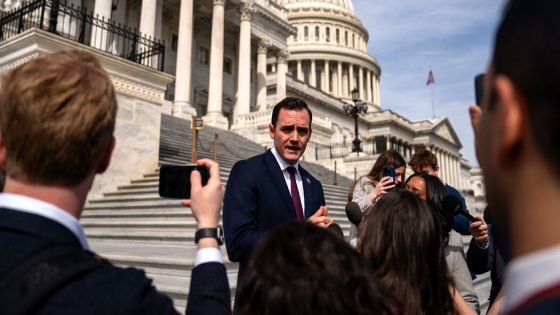Republicans in Congress continue sprinting for the exits.
Representative Mike Gallagher, Republican of Wisconsin, announced on Friday afternoon that he would resign from Congress months earlier than expected on April 19, bringing the already minuscule Republican majority down to a lonely one vote.
After his departure next month, Republicans will control 217 House seats to the Democrats’ 213, allowing the G.O.P. to afford only a single defection from the party line on votes when all members are present.
Mr. Gallagher, the four-term lawmaker who serves as chairman of the Select Committee on the Chinese Communist Party, provided no reason for his early exit in the brief statement he made announcing his plans. He said simply that “after conversations with my family, I have made the decision to resign my position,” and that he had “worked closely with House Republican leadership on this timeline.”
But leaders had not publicly indicated they expected any more departures. It came on a day that highlighted Republican disarray and division, as Speaker Mike Johnson pushed through a $1.2 trillion spending bill that prompted a revolt on his right flank and at least one of his members to begin the process of calling a vote to remove him.
After Representative Ken Buck, Republican of Colorado, surprised Mr. Johnson this month with an announcement that he was resigning imminently, the speaker said he did not expect more members to follow.
“I think, I hope and believe that that’s the end of the exits for now,” he said less than two weeks ago.
Mr. Gallagher, one of three Republicans who voted against impeaching Alejandro N. Mayorkas, the homeland security secretary, announced after that vote that he did not plan to seek another term — already an unusual move for a young committee chairman. It reflected the frustration felt by many House Republicans serving in what they describe as a dysfunctional governing body.
Mr. Gallagher’s early exit will make it even more difficult for Mr. Johnson to pursue any legislation that cannot draw Democratic votes, and will give every Republican more leverage as the speaker tries to steer his unmanageable majority through an election year.
On Friday, for instance, with the majority of Republicans opposed to the spending measure, Mr. Johnson was forced to rely primarily on Democratic votes to pass it.
The current makeup of the House leaves Republicans with almost no cushion to deal with the inevitable absences caused by illness, travel delays, weddings, funerals and unforeseen events that could keep their members away for votes.
Next month, Democrats are likely to fill a safe seat that was occupied by Representative Brian Higgins of New York, who left Congress to become president of the Shea’s Performing Arts Center. In the late spring and early summer, Republicans are likely to fill two solidly Republican seats that have been vacated by Representatives Bill Johnson of Ohio, who left Congress to become the president of Youngstown State University, and Kevin McCarthy, who resigned from his California seat at the end of last year after being ousted from the speakership.
Mr. Gallagher’s announcement came the same day that Mr. Buck was packing up the last items in his bare office on his final day in the House, after his recent announcement that he, too, was cutting short his final term.
Source Agencies


